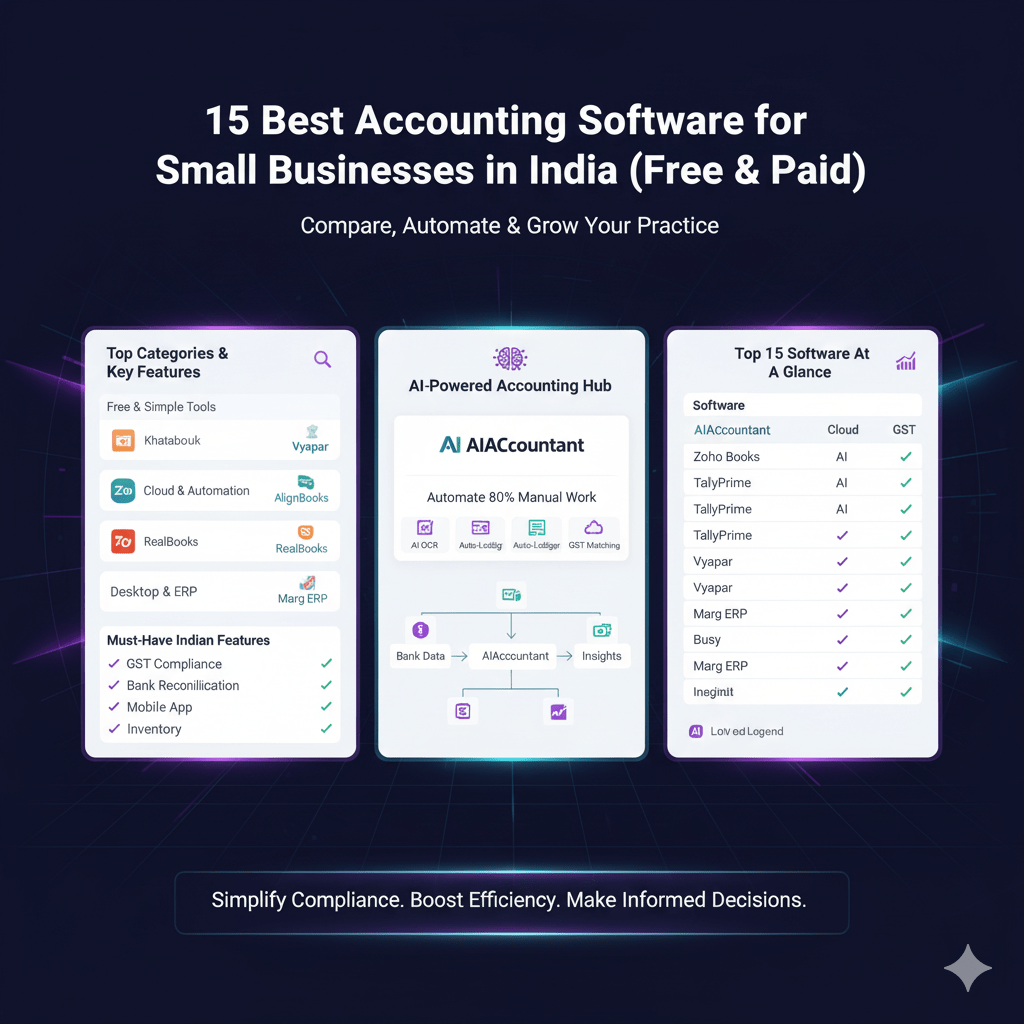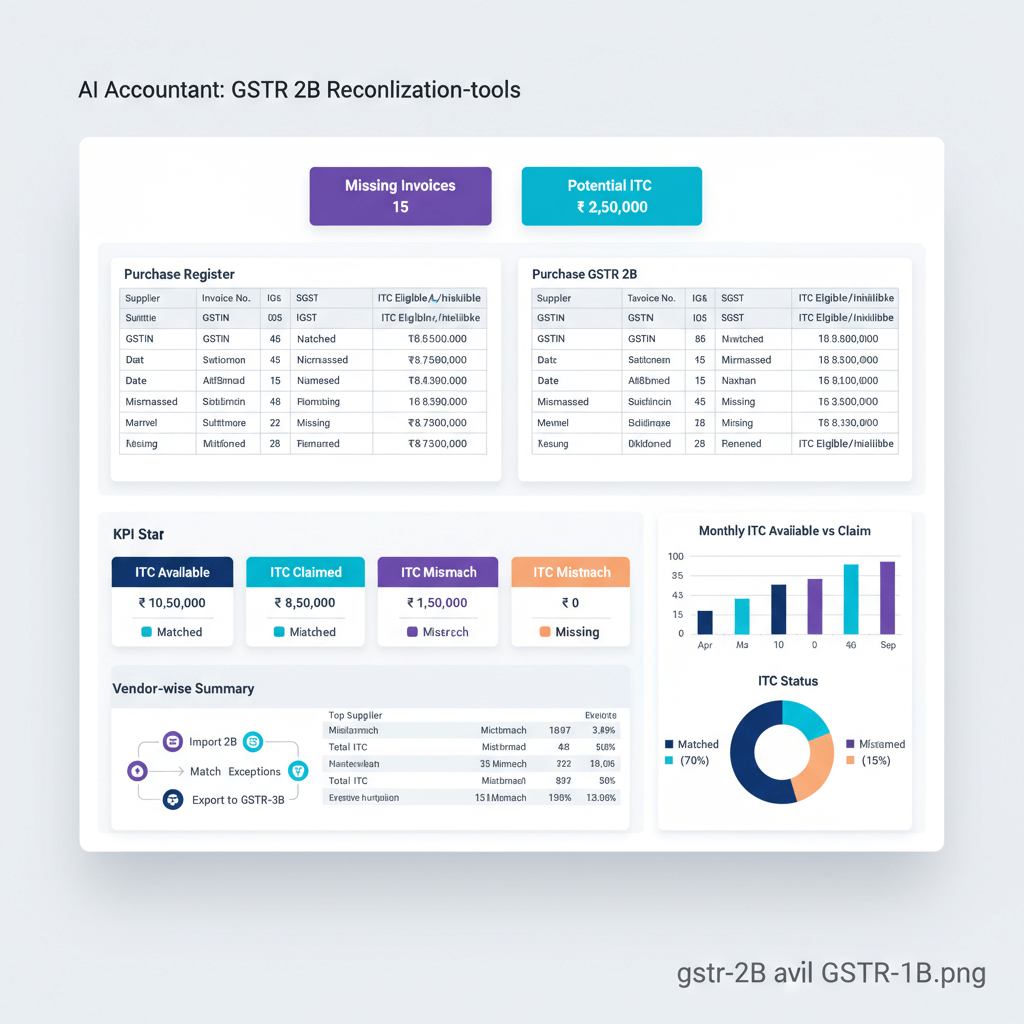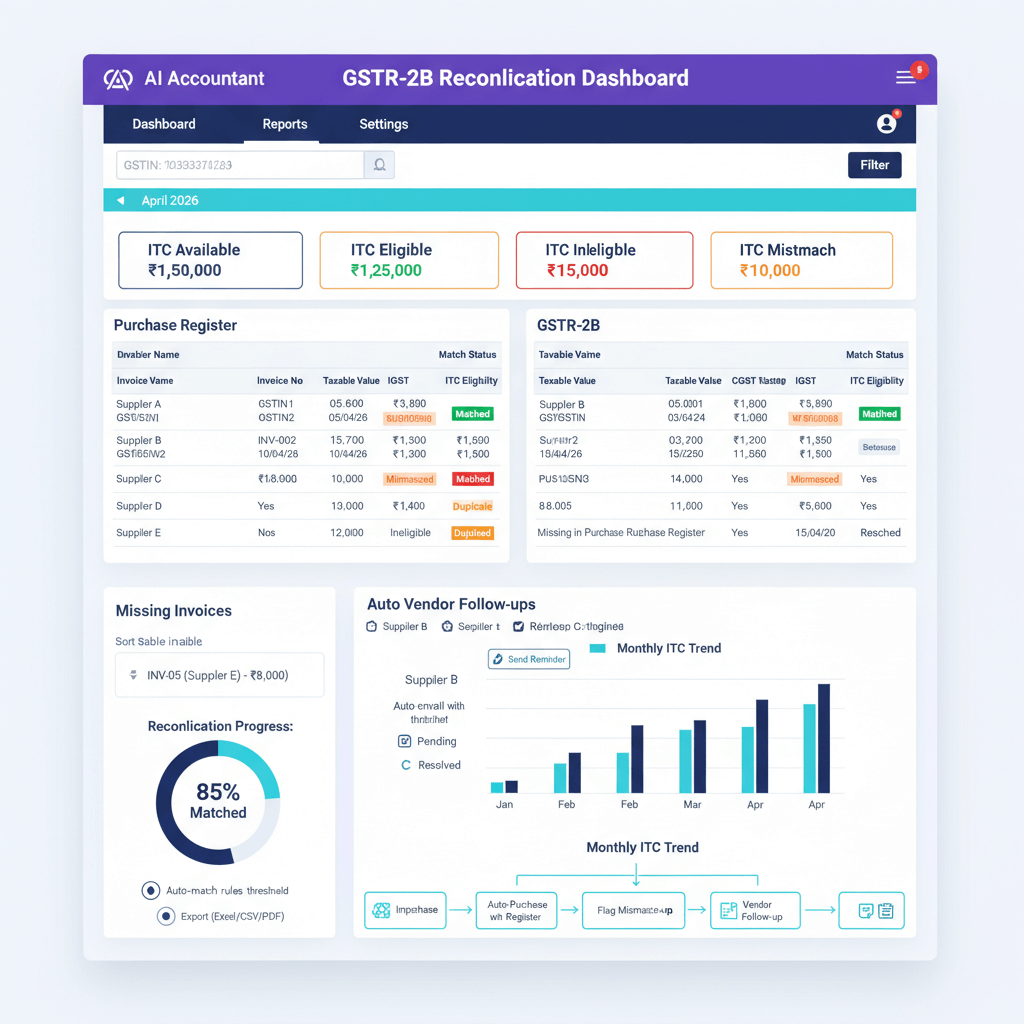Running a small business in India today is more complex than ever. With all the requirements such as GST compliance, invoice management, vendor follow-ups, and day-to-day bookkeeping, the majority of SMEs are left with very little time for business growth as they are preoccupied with accounting. Among the problems that occur in the businesses are manual data entry, reconciliation errors, and delayed filing, which not only cost the enterprises’ money and time but also rob them of peace of mind.
Moreover, the GST environment has become more challenging over time. Business owners are now required to handle GSTR-1, GSTR-3B, e-invoicing, HSN-wise reporting, and vendor-side mismatches. The accuracy and speed demanded cannot be met by traditional bookkeeping methods.
This guide with a list of the 15 best accounting software for small businesses in India, both free and paid, is here to support you in finding the most suitable solution. This list, which includes AI-powered tools that automate reconciliation and mobile-first billing apps made for small shops, covers every kind of SME needs.
Let’s start.
Best Accounting Software for Small Businesses in India
The 15 Best Accounting Software for Small Businesses in India (Free & Paid)
India has no shortage of accounting tools, but not all of them actually save time or reduce the manual workload that small businesses struggle with. Below is a curated list of the 15 best accounting software for Indian SMEs in 2025, starting with the most modern, automation-first solution.
1. AIAccountant (AIA)
AIAccountant is one of the few tools built specifically to eliminate the repetitive tasks that slow down Indian accounting teams. It sits on top of existing systems like Tally and automates the parts humans waste the most time on.
Key strengths:
- Transaction Module: Reads bank transactions and maps them to the correct ledgers automatically.
- Bills Module: Its biggest value—AI reads invoices using OCR and pushes them into Tally, cutting processing time from minutes to seconds.
- Dashboard Module: Lets founders and CEOs see financial insights without ever opening Tally.
- GST Reconciliation: Matches GST filings (buying vs. selling) using data pulled directly from the GST portal.
AIA saves hours of manual work every week and delivers the highest ROI for B2B businesses with steady billing volume.
2. Zoho Books
Zoho Books offers a clean interface, GST-ready invoicing, automation tools, and smooth integrations, making it a reliable cloud accounting solution. With a generous free plan for eligible small businesses, it provides strong value while simplifying compliance and everyday bookkeeping.
3. TallyPrime
TallyPrime remains India’s most widely used accounting software, known for its strong compliance features, inventory management, and reporting capabilities. It is the default choice for accountants and businesses that rely on a traditional, locally installed workflow.
4. Vyapar
Vyapar is a mobile-first billing and inventory tool built for Indian small businesses. It supports GST invoicing, barcode billing, expense tracking, and quick day-to-day bookkeeping, making it a practical choice for shop owners and traders.
5. Refrens Cloud Accounting Software
Refrens is a cloud-based invoicing and accounting software built for SMEs in India. It helps businesses create GST-ready invoices and quotations, automate workflows, manage inventory, and track expenses from one place. Refrens includes an AI accounting assistant with OCR for data capture, GST reconciliation, role-based access, and mobile apps for on-the-go use. The software also provides GSTR reports and financial reports, making it suitable for businesses that need simple, compliant, and user-friendly accounting.
6. Busy Accounting Software
Busy is widely used in wholesale and distribution sectors due to its strong inventory features, including batch management and multiple godown support. It is ideal for businesses needing detailed stock tracking linked tightly with accounting.
7. Marg ERP
Marg ERP is built for businesses with MRP-based billing and large inventory needs, especially in FMCG and pharmaceutical sectors. It handles complex inventory scenarios and offers industry-specific features that many generic tools lack.
8. myBillBook
myBillBook is a simple, mobile-friendly billing and accounting solution for micro and small businesses. It makes invoicing, payment tracking, and basic accounting easy without overwhelming users with complexity.
9. Khatabook
Khatabook focuses on simple bookkeeping, payment tracking, and digital ledger management. It is ideal for small shops and solo operators who need an easy, smartphone-based way to track daily business activity.
10. ProfitBooks
ProfitBooks provides easy invoicing, expense tracking, and basic inventory in a clean, cloud-based interface. It works well for businesses transitioning away from manual bookkeeping or spreadsheets.
11. Book Keeper
Book Keeper supports offline accounting with optional cloud sync, making it suitable for businesses in areas with inconsistent internet. It includes GST billing, inventory, and multi-device access.
12. AlignBooks
AlignBooks provides GST-enabled accounting, inventory management, and CRM modules in an affordable cloud package. It is a practical option for businesses wanting to move away from desktop software without losing familiar workflows.
13. RealBooks
RealBooks is a cloud-first accounting platform with strong GST features, multi-branch support, and a clean interface. It is ideal for businesses that want a more modern experience than traditional desktop tools while still managing inventory and accounts efficiently.
14. GNUKhata
GNUKhata is an Indian open-source accounting software offering GST invoicing, basic inventory, and simple reporting. It is suited for small businesses and non-profits that want essential accounting capabilities without recurring subscription costs.
15. HostBooks
HostBooks combines accounting with GST, TDS, e-way bills, and e-invoicing, creating a unified compliance and bookkeeping platform. It is particularly useful for SMEs managing heavy statutory requirements alongside their daily accounting.
16. Saral Accounts
Saral Accounts provides GST-ready accounting, billing, and basic inventory features with an easy-to-use interface. It integrates well with other Saral compliance tools, making it a good fit for SMEs wanting straightforward, India-focused accounting.
Factors to Consider When Choosing Accounting Software
Choosing accounting software isn’t just about features—it’s about finding a system that actually makes your daily work easier. For Indian small businesses, the right tool should simplify GST, reduce manual errors, and give you clarity over your numbers. Here are the most important factors to look at.
1. GST Support (Non-Negotiable in India)
GST compliance is unavoidable for most Indian SMEs, so your software must handle it well. Look for:
- Simple GST invoicing
- HSN/SAC support
- Easy GSTR-1 and GSTR-3B preparation
Good GST support reduces mistakes and saves hours every month.
2. Automation Capabilities
Not all automation is useful. You want automation that reduces manual work, such as:
- Categorizing transactions
- Reading invoices automatically
- Matching entries with bank statements
These features are what actually cut down repetitive effort—not just marketing fluff.
3. Integrations With Tools You Already Use
The best software should fit into your existing workflow. Ideally, it integrates with:
- Tally
- Your bank
- Billing systems
- GST portal
Integrations avoid duplicate work and reduce the chance of errors.
4. Ease of Use for Founders and Teams
Finally, the software should be simple enough that the business owner can understand it without needing an accountant beside them. A clean interface and intuitive dashboards go a long way in making accounting less intimidating.
Conclusion
Choosing the right accounting software can make all the difference for a small business – and we’re not just talking about bookkeeping. The right tool not only saves time and reduces errors but it also helps with compliance, and gives business owners a clear view of the numbers so they can make better decisions. And let’s be honest, with Goods and Services Tax requirements becoming a bigger headache every day, vendor reconciliation and monthly filings are getting tougher to manage. Trying to hack it with manual processes or outdated systems just doesn’t cut it.
Every business is unique, so the best software for you will depend on your size, industry, and level of complexity. You might be thinking of going with a cloud tool like Zoho Books, sticking with a traditional system like TallyPrime, or just a simple billing app like myBillBook – whatever you choose, what matters is that you choose the right one for your business.
If you want to get out from under all that manual accounting work and build a finance process that really hums, then AIA’s worth checking out, find out it’s ideal for your needs by scheduling a demo.
Frequently Asked Questions (FAQ)
What’s the simplest accounting software in India?
For people new to the whole accounting thing – usually small business owners with not a lot of experience – try software like myBillBook, Khatabook, or ProfitBooks. They keep things simple with basics like creating invoices, paying bills, and bookkeeping, not overwhelming you with a million features. They’re perfect for tiny businesses, shop owners, or anyone starting out.
Do Indian accounting tools offer e-invoicing for businesses?
Most of the mid-range and more advanced software (think Zoho Books, TallyPrime, Busy, Marg ERP, HostBooks, or RealBooks) will support e-invoicing for businesses that need to e-invoice. Anything that makes a business fall under the high turnover threshold. But just remember – not many of the super lightweight bill apps will have this feature, so if you’re thinking of growing, choose something that already has it covered.
Can I migrate from Tally to cloud accounting software?
Yes, tools like AiAccountant, Zoho Books, AlignBooks, RealBooks, and ProfitBooks have import features for masters and transaction data from Tally. The complexity of migration depends on how clean and consistent your existing data is. Many SMEs use a hybrid approach, keeping Tally for statutory compliance while using cloud tools for visibility, reporting and remote access.
Which software is best for GST-heavy businesses?
Businesses that do frequent GST filings, vendor reconciliations and e-invoice requirements tend to prefer software like AIAccountant, HostBooks, Zoho Books, Busy or TallyPrime. These platforms have stronger compliance workflows and reduce the risk of mismatches and filing delays.
What’s the difference between cloud accounting and desktop accounting?
Cloud accounting lets you access your books from anywhere, collaborate with teams and have automatic backups. Desktop accounting software is better offline and preferred by traditional accountants. SMEs that need mobility and automation choose cloud tools, while businesses with legacy workflows stick to desktop systems.
Which accounting software is fastest for invoicing?
AIAccountant wins here as it uses OCR and AI to extract invoice data and push it into Tally, reducing manual entry time by a huge margin. For businesses with high invoice volume, this automation gives a big speed advantage.
Can I manage multiple branches or GSTINs in one software?
Yes. Tools like AiAccountant, RealBooks, Zoho Books, Busy, Marg ERP, HostBooks support multiple branches, GSTINs and consolidated reporting. This is very important for trading, distribution and multi-state operations.
Is AI accounting useful for small businesses?
Yes. AI helps eliminate hours of repetitive tasks – like categorising transactions, entering invoices or matching GST data. Tools like AIAccountant gives SMEs enterprise grade automation at an affordable cost, so small teams can work much more efficiently.
-01%201.svg)





